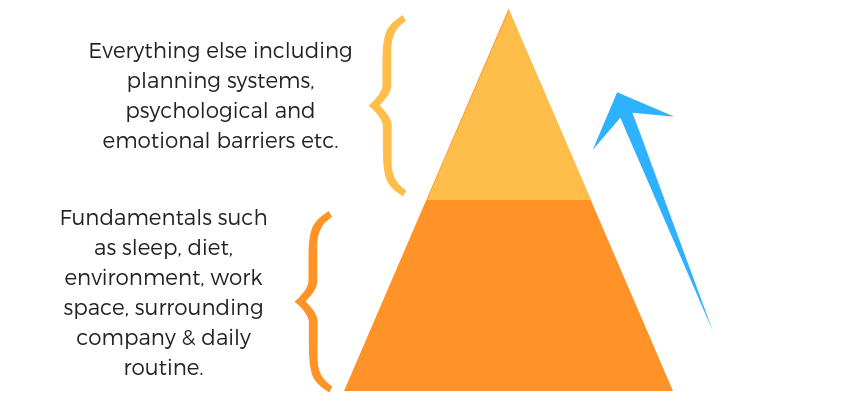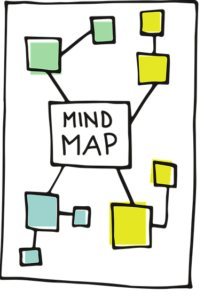Guest Post By Dr. Aimen Of The Muslim Youth Programme
Powerful Time Management Systems for Busy Career Muslims

“I can’t manage my time as well as other successful Muslims do”.
“I’m busier than most people”.
“I’ve tried to follow some time management tips. I even downloaded top productivity apps but nothing seems to work for long!”
Would you agree with any of the statements above? This is real stuff that real Muslims have said to me.
We all like to think of ourselves as special unicorns when it comes to time management, but the reality is almost ALL of us can relate to the statements above.
So how come some Muslims seem to get a ginormous amount of work done and still manage to spend quality time with family yet the rest of us struggle to just get through the day?
Here’s the harsh truth:
- All of us have the same amount of hours in a day. But only some of us manage our time really well.
- You can download ALL the productivity apps in the world and learn every tactic in the book, but if you don’t make these basic changes in your life, you’ll never be able to manage your time. That’s how harsh the reality is.
What basic changes am I talking about? And how can I say this with such confidence? Read on to find out.
THE BROAD-TO-NARROW APPROACH:
When it comes to time management, approach it with a broad-to-narrow mindset.

The broadest area that needs to be managed first covers all your fundamentals.
Fundamentals include sleep, environment, workplace, diet etc. If you fail to optimize your environment for productivity, nothing else matters. The funny thing is, most of us ignore this saying that it’s the same old advice we hear from our grandmothers. Well, turns out our grandmas are most definitely right.
That’s precisely why if you think an app will help you manage your time, you have already lost.
Only AFTER you have optimized your environment (home as well as work), should you start focusing on other things like motivation, discipline, eliminating time-wasters, planning, delegating tasks etc.
COVERING THE BASICS: 4 ridiculously simple fundamentals we all know but don’t follow
If you get these straight, you are way ahead of 90% of Muslims struggling with time management.
# 1: 7-8 Hours of sleep. Every. Night.
Sounds like boring advice right? Maybe you’re nodding and saying “yeah I get it”. But very few of you are actually going to take it seriously and fix your sleeping routine.
Today, sleep is seen as some kind of weakness. People who sleep less than 7 hours and work more are identified as productivity gurus. The truth is less sleep makes you physically weak and mentally unfocused.
According to the teachings of our Prophet (S.A.W) sleep holds a HUGE place in the productivity matrix. Prophet (S.A.W) gave detailed guidelines covering the importance of sleeping early, duration of sleep, the manners of sleeping, mid-day naps, sleep position etc. So consider sleep as a blessing from Allah.
“And among his signs is your sleep by night and by day and your seeking of His bounty, verily in that are Signs for those who hearken”
[Quran, Surah Rum 30: Ayah 23]
If we don’t fix this fundamental part of our life following guidelines from Sunnah, we just can’t expect to be productive Muslims. Also, once you get in the habit of sleeping 7-8 hours each night, the remaining parts of this time management system will become way easier.
# 2: Get yourself, your room and your work-place organized.
Let me tell you a weird thing I do. I clear my head a minimum of 7 times a day. I know- C.R.A.Z.Y. But. It helps declutter my mind and keeps me focused while working.
Do you have to be as weird as me to be productive? Absolutely not. Then how does this translate for you?
Do whatever floats your boat to declutter your mind, your work/ study space, your room etc. (Don’t go overboard and start decluttering your entire neighborhood :D).
The habit of decluttering will save you HOURS each day. It will also save you from unnecessary stress and overwhelm you feel because of a messy environment. Remember, overwhelm is one of the biggest killers of productivity.
Here are a few ways you can declutter your mind:
- If you are a worrywart and tend to overthink things a lot, set aside 15 minutes of your time to just worry. As you catch yourself worrying during any other time of the day, remind yourself that it’s not time to worry yet. When it’s time to worry, sit down and worry. But this way, you won’t allow your regular worries to take over your entire
- Talk to yourself. Out LOUD. It’s insanely effective. Whenever you are feeling overwhelmed and are overthinking things, step outside where nobody can hear you and say all the thoughts that are bothering you out loud. It will free up space inside your brain and you will come back to work feeling strangely relieved. This is what I personally do every day to declutter my mind.
- If you are a Journal-lover, then keep a plain/ bullet journal where you can create mind-maps of your thoughts to organize them. I create mind-maps before working on complicated projects.

Here are a few ways you can declutter your work zone by removing distractions:
- Remove all unnecessary objects from your work space (extra books that you won’t be reading that day, magazines, rough papers etc.)
- Put your phone, iPad and all unnecessary gadgets away (or on flight mode) while working.
- Close all extra tabs on your laptop.
- If you have a stay-at-home job, create a separate area for work (that’s NOT your bedroom).
- Stick daily reminders of the most important tasks for the day on your notice board (if you don’t have it, DIY it) or table using sticky notes.
- Decide what piles of paper and stationery goes in the drawers and what stays on your desk.
- Designate different drawers for particular things such as older files/ books, stationery, paper cups etc.
- Make a habit of decluttering your work table at the end of every workday.
# 3: Your DAILY schedule and routine matters the MOST.
Do you follow routines? If you don’t, you better start now.
If you believe that you can manage your time most efficiently without a productive morning (and night) routine, think again.
Have you ever wondered why Allah S.W.T made 5 prayers on fixed times every day obligatory upon us?
One of the many reasons could be that this Fard (obligatory) act of Ibadah teaches us the importance of regularity and consistency.
Knowing when you’ll sleep and wake up each day is one of the most important fundamentals of time management.
Want to take your productivity a step forward? Create a morning routine according to the Sunnah of our beloved Prophet (S.A.W). Stay awake after Fajr prayer, read Quran, make dua, exercise, plan your day and pray Salah-tul-Duha before you go to work.
A productive morning routine will add the special power ingredient to your time: Barakah.
# 4: Be mindful of the people you surround yourself with.
Think about the people you interact with regularly. Do you let them steal your time (unintentionally) with idle talk?
While we are too busy focusing on productivity apps and cool time management techniques, we forget to notice the amount of time we waste being in the company of slackers.
Stay away from slackers who waste time talking.
The Prophet SAW said: “Whoever believes in Allah and the Last Day, let him say what is good or remain silent.” [Bukhari and Muslim]
Avoid being in the company of idle people at your workplace or college because you’ll not only waste time that way but also lose Barakah from your day, not to mention become prone to gossiping or backbiting.
Instead, try and surround yourself with productive Muslims who value time. I assure you that you’ll feel the difference in your energy levels as well as the number of tasks you’ll be able to accomplish on such days.
Now that we’ve covered our basics, let me introduce you to the concept of creating planning SYSTEMS in your life that will save you countless hours each week.
Creating Weekly and Daily Planning Systems

Here’s the way I see things: Weekly and daily plans are essential for maximizing productivity.
Set up your planning system once and you’re done forever. From that point on, all you have to do is follow it.
For busy career Muslims, I can understand how difficult it is to follow plans. But trust me when I say this: Efficient plans should make things easier for you not harder.
If you can never manage to follow your plan then I’m going to be honest with you and say that you’re probably doing something wrong while planning. And that’s fine. Because today I want to give you a clear outline you can follow while creating a realistic plan that will push you to take action and save you time that you waste while trying to figure out where to start.
Here are 4 simple rules you can follow when planning your day:
- Plan your day ideally the night before or early morning as a part of your morning routine.
- Keep only 3 MITs (most important tasks) for a day. If you keep anywhere between 1 to 3 tasks on your daily planner, you’ll feel less overwhelmed, will be able to actually complete them and will feel more satisfied with yourself at the end of the day.
- Follow a task execution system to complete your tasks. I personally use the Pomodoro technique. Other methods include time-blocking, 80/20 rule
- Spend 5min on self-evaluation and review at the end of the day. Take note of how many tasks you managed to complete. If you’re consistently unable to complete 3 major tasks per day, figure out the cause and remove it. (Causes could be wasting time on social media, overloading your day with more than you can get done, procrastination, spending too much time on one task etc.)
The next challenge that undoubtedly all of us face are emotional barriers of one kind or another.
Facing the Psychological and Emotional Barriers to Productivity
Here are a few of the common emotional barriers (there are plenty others) that stand in the way of our productivity.
- Motivation
- Consistency
- Procrastination
- Setting boundaries
No quick 10-second tactic will help you get through this stage and if you can’t move past it, no technique/ app can help you be productive in the long-term. Yes, it’s hard. But only you can do it.
With that said, I want to show you simple ways in which you can tackle each of these barriers.
- The biggest source of motivation is within yourself.
We are all waiting for that motivation-pill that will solve everything for us within seconds. It doesn’t exist.
The strongest motivation is that which comes from within. Don’t wait for someone around you to motivate you to do things you need to do.
Why do you need motivation anyway? To achieve your goals. Your goals could be anything, for e.g., losing 10 pounds of weight, studying Tafseer of the Quran, completing a work-related project etc.
The best way to find that motivation within self is by setting up systems to work on your goals. Create planning systems that make large long-term goals so easy to achieve that you can get up and work even on low motivation days.
Also, make sure you schedule all the tasks you need to do, in order to achieve your goals, in your monthly calendar. Setting up your schedule will ensure you cover each task in a systemic way.
You should think of motivation as a type of energy. Just like with other types of energy, the motivational energy stores get depleted over the course of your day. So, you can prevent burnouts by giving frequent breaks to both; your body and your mind.
- Build goal-oriented habits for consistency.
When you learn how to motivate yourself every day to work on your big goals, consistency becomes a no-brainer.
All you need to do is set up goal-oriented daily habits that are easy to maintain and you’re good.
For e.g. if your large goal at the moment is writing a book, you could dedicate an hour or two early morning (or whenever you are most creative) every day to write a few hundred words. You could fix a time in your daily schedule for that one task and focus only on that particular task.
Would it be right to say you’ll be consistent if you are working on your goal every day even if for a few hours? I’d say so. Those couple hours every day will add up over weeks and before you know it, you’ll be standing at the finish line.
But that’s not what most of us do right? We get excited over a new goal we’ve set for ourselves and jump right into it. In a matter of days, we get burnt out and leave it altogether, saying to ourselves “I don’t have time for this. I’ll work on it when I get some time.” Does that time ever come? Of course not.
That’s why setting up small goal-oriented habits is the key to consistency.
- Procrastination kills time and gets you nowhere.
Narrated by Uqba bin Al-Harith: Once the Prophet (S.A.W) offered the Asr prayer and then hurriedly went to his house and returned immediately. I (or somebody else) asked him (as to what was the matter) and he said, “I left at home a piece of gold which was from the charity and I disliked to let it remain a night in my house, so I got it distributed.” [Sahih Bukhari]
Here’s what we can take away from this Hadith: You have a task you need to do? Get up and do it immediately or else Shaiytan will convince you “you don’t need to do it now”. Over time he’ll convince you that “you don’t need to it at all”.
You don’t want to be in that position where you’re hosting a constant war within self just to get that task done.
It is much easier to just get up and do the task than fight a battle within yourself that will most likely end up with you doing the task anyway but also wasting plenty of precious time in the process.
- Setting boundaries, outsourcing and delegating.
So many times when I hear someone say they’re overwhelmed, I find out that they don’t know how to set boundaries. As a working Muslim or student, you need to set clear boundaries. If you don’t, you will get pulled in a hundred different directions and feel constantly overwhelmed.
Another common problem we all face is outsourcing our tasks to others. Let me give you a 2-min solution for deciding which task to delegate.
So before you decide to work on a time-consuming task, put that task in a funnel. Ask yourself 2 questions:
- Do you need to do this task now? This short question will help you eliminate unnecessary tasks and decide which ones are urgent (need your immediate attention) and which ones can wait for later.
- Would it make sense to delegate the task that might take you longer than it would take someone else (because of the lack of your expertise in that area)? I think it would.
For example, if you’re a writer and you don’t know much about designing a book cover, find someone else who does (a graphic designer) rather than spending hours trying to do it yourself.
Another way to delegate tasks is by teaching someone else, who might be interested, to do the things you already know how to do but don’t want to spend time actually doing them.
Winding up, this approach is probably different from the time management tactics you read everywhere.
Yes, I agree it’s more challenging to follow a system that forces you to step out of your comfort zone, face your psychology and take action because we all want quick 1 min solutions to our problems. But trust me, once you follow this system you’ll no longer have to rely on others motivating you.
You’ll learn how to plan, execute tasks, control your environment, achieve big goals slowly but surely, and set boundaries.
Set up these systems once and you’re finished, as compared to other Muslims who spend their entire lives wondering why they aren’t productive and able to manage time as well as other successful Muslims do.
Now I’m curious. Tell me one thing you do to manage your time as a busy career Muslim. Let’s talk in the comments section below!
AUTHOR BIO: Aimen is a Medical Doctor and the founder of Muslim Youth Programme. She teaches self-development to young Muslims struggling with the fitnah of this century. Her aim is to educate and empower Muslims with practical advice on self-development, productivity, studies and health, with insights on Islamic psychology. Jumpstart your productivity and take action on your goals by signing up to her latest FREE productivity Bootcamp for Muslims.









